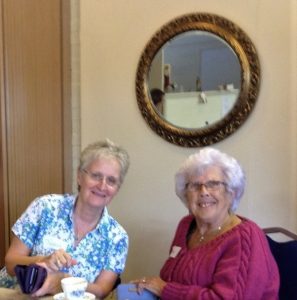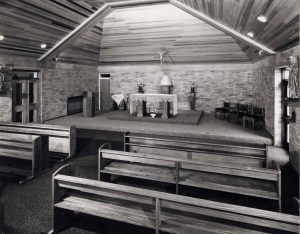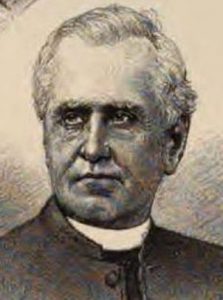Archives Blog October 2018
The Archives and the SMG Associates: A recent event at Rosemont Convent, Liverpool

SMG Associates Josie Cribbin and Joan Stuart
In my previous post, I was concerned to address the issue of how archives may speak to us today, and feed into a living tradition of work and worship. The archives in Brentford have frequently over the years welcomed and hosted scholars into the history of aspects of the religious life, and thus the story of the SMGs becomes part of the wider discourse and dialogue about the history of the church, the history of the religious life, and the history of the many human communities which the congregation has served in its long history. But history is, of course, not merely the property of the historian: The Vatican Pontifical Commission on Cultural Heritage expresses this well: ‘Archives… should be offered primarily at the service of the community which has produced them. But in time they assume a universal destination because they become the heritage of all humanity’.
Part of the role of archivists is, therefore, to share the heritage of which they are privileged to be custodians with as wide a range as possible of interested individuals and groups, but particularly with representatives of the particular institution or community whose history they are tasked with safeguarding. Through methods such as providing exhibitions, contributing to publications, and the giving of historical presentations and talks, an archivist takes knowledge out of the archive, and allows a wider range of opportunities and methods for individuals and groups to engage actively with their heritage. The archivist should always have in mind the parable of the talents, and the response to the individual who merely hid his treasure away in the ground (Matt. 25:14-30).

The original 1970s chapel at Rosemont convent
I was very pleased therefore, earlier this year, to have an approach from the SMG Associates based in the north-west of England to make a further contribution to their programmes, in order to assist them in engaging with aspects of the history of the congregation and its works. Facilitated by Sr Annie Lunney SMG, the decision was made to develop ideas for a session in the form of a workshop – not a methodology which has been utilised by the SMG Archives previously – which would allow small groups of associates and sisters to engage actively with copies of documents relating to particular historical topics, and to report back on their thoughts and responses as part of the event. The ‘brief’ for the archivist was to suggest topics connected to the life of Mother Magdalen and the work of the early SMG Sisters from which the participants could select those which seemed to most resonate with them as being suitable for discussion. The associates have been very keen to engage with historical topics connected with the SMGs, as reflected in a recent ‘armchair pilgrimage’ of sites in Liverpool, and a study of Lady Georgiana Fullerton (often referred to nowadays as ‘the first SMG Associate’), based upon Mother Magdalen’s spiritual biography of her, entitled The Inner Life of Lady Georgiana Fullerton.
The day went ahead on 1st September 2018, with prayer, reflection and overall co-ordination of the event on the day being provided by Sr Annie. The topics chosen were Mother Magdalen and her literary legacy; Mother Magdalen and her relationship with Cardinal Newman; Mother Magdalen and her relationship with her great friend and supporter Lady Georgiana Fullerton; and the founding SMG works in Liverpool. The latter topic seemed particularly appropriate, for Rosemont Convent where the gathering took place, dates back almost to the origin of the SMG work in Liverpool, being established in 1901 to support the work of the refuge for women at Paul Street near the Liverpool docks. It was acquired by the famous Mgr James Nugent ‘father of the poor’, who had worked in Liverpool in close collaboration with the SMG founder, Mother Magdalen Taylor, in their joint work to relieve the poor and vulnerable of the city.

Fr James Nugent
The gathering took place in what was once the chapel of the building, much of which was rebuilt in the early 1970s: this room has been beautifully adapted for community use and is host to many associates’ meetings. It would be impossible in the small scope which I have here to give a detailed account of the day, but as is generally characteristic of communal events informed by the SMG Charism, it was attended by much vigorous and good humoured debate and discussion, and a very dedicated level of engagement with the resource material chosen. It is probably fair to say that this was a novel form of engagement with historical sources for most of those there, and they faced the challenge of engaging with and responding to previously unseen historical material within quite a limited timespan. I will long cherish the comment of one participant that Mother Magdalen’s approach often involved saying ‘gentle things in a very pointed way’, reflecting the fact that she very effectively combined respect for individuals with a determination to take forward her schemes to further the Kingdom of God.
In the aftermath, I am pleased to report that this experiment seems to have been valued by the participants, that the format was deemed to be a success, and that the event seems likely to encourage further research and historical study. There is relevant material not only in the SMG Archives but in other church and public archives in Liverpool and elsewhere, and material which can be loaned from the extensive library collections in Brentford. It is my hope that this event will bear further fruit in time to come, and anyone wishing to access copies of the resources used on the day should please contact me.
Pictures of the SMG Northern Associates Courtesy of Sr Annie Lunney SMG
Paul Shaw
